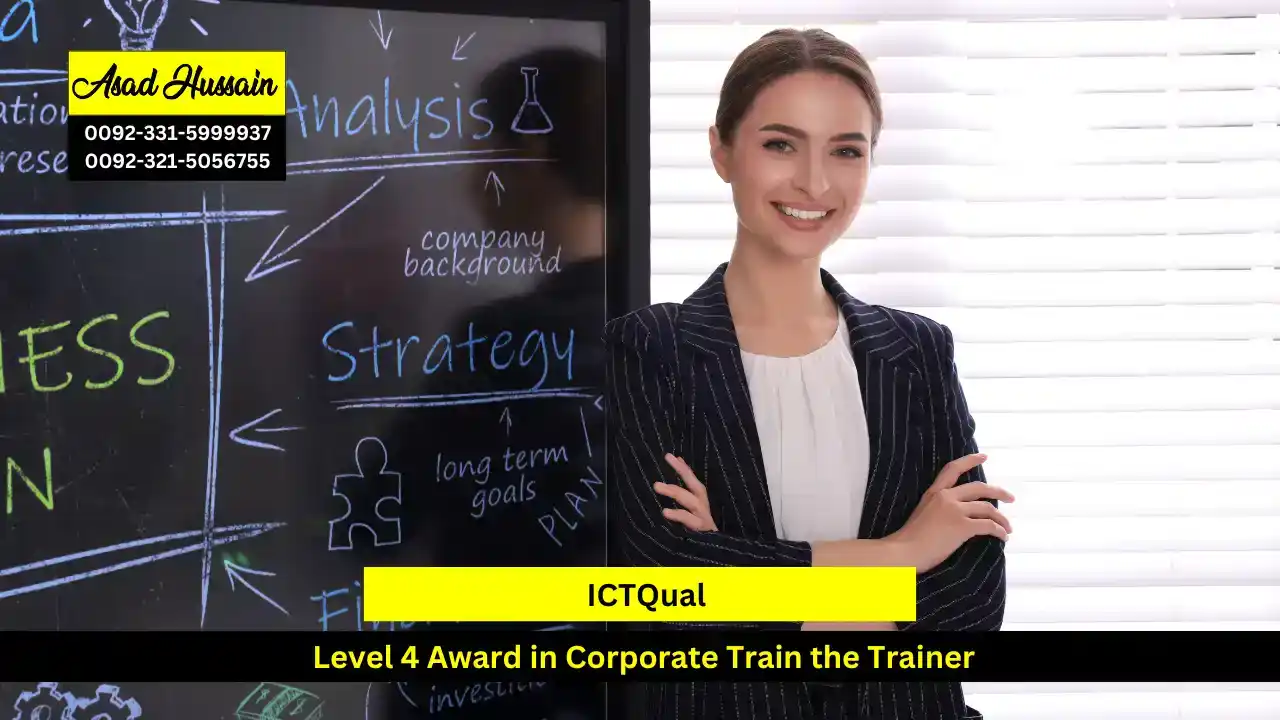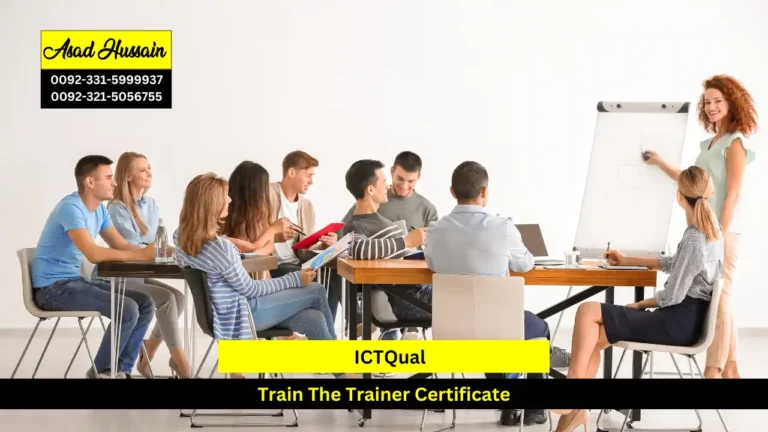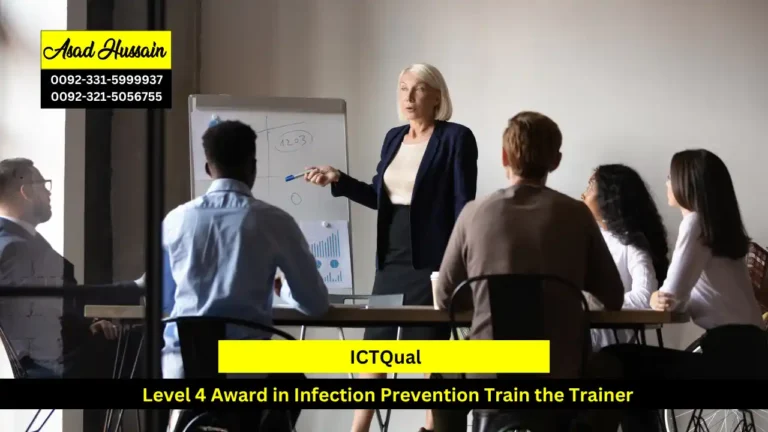In today’s fast-paced corporate world, the ability to deliver effective training is more critical than ever. As businesses strive to maintain a competitive edge, the need for skilled trainers who can impart knowledge and skills efficiently is paramount. The ICTQual Level 4 Award in Corporate Train the Trainer is designed to meet this need by providing individuals with the tools and techniques necessary to become exceptional corporate trainers. This blog post explores what the ICTQual Level 4 Award entails, its benefits, and why it’s an essential qualification for aspiring trainers.
The ICTQual Level 4 Award in Corporate Train the Trainer is a comprehensive certification program that equips participants with advanced training methodologies and practical skills required to design, deliver, and evaluate effective training programs in a corporate setting. This qualification is tailored for individuals who are either new to the training profession or experienced trainers seeking to enhance their skills and credentials.
The ICTQual Level 4 Award in Corporate Train the Trainer is a valuable investment for anyone looking to excel in the field of corporate training. By providing a comprehensive curriculum, practical experience, and expert instruction, this program equips participants with the skills and confidence needed to deliver impactful training sessions. Whether you are starting your journey as a trainer or looking to enhance your existing skills, this qualification offers the essential tools to succeed and make a meaningful impact in your organization. Embrace the opportunity to elevate your training capabilities with the ICTQual Level 4 Award in Corporate Train the Trainer.
Program Highlights
Mandatory Units
- Foundations of Adult Learning
- Advanced Instructional Design Techniques
- Facilitation Mastery
- Customizing Training Programs
- Evaluation and Feedback Strategies
- Technology Integration in Training
- Professional Development for Trainers
- Training Documentation and Records Management
Entry requirements for a Level 4 Award in Corporate Train the Trainer Course may vary depending on the institution offering the program. However, typical entry requirements for such a course may include:
- Prospective participants should have a minimum of 2-3 years of experience in a corporate training or related role. This experience ensures that candidates have a foundational understanding of training principles and practices.
- While not always mandatory, many Level 4 Corporate Train the Trainer programs may require a bachelor’s degree or equivalent qualification in a relevant field such as education, instructional design, human resources, or business administration. This educational background demonstrates a commitment to learning and a solid academic foundation.
- Candidates should have evidence of previous training experience, whether through leading workshops, conducting seminars, or facilitating corporate training sessions. This practical experience showcases the candidate’s ability to engage learners and deliver effective training content.
- A fundamental understanding of adult learning principles is essential for success in Level 4 training. Candidates should demonstrate knowledge of concepts such as learner-centered instruction, experiential learning, and the importance of addressing diverse learning styles.
- Strong verbal and written communication skills are imperative for trainers. Candidates should be able to articulate ideas clearly, facilitate discussions effectively, and create engaging training materials. Additionally, proficiency in the language of instruction (usually English) is typically required.
Foundations of Adult Learning
- Understanding Adult Learning Principles: Gain a deep understanding of how adults learn best, including theories such as andragogy and experiential learning.
- Adapting Training Methods: Learn to adapt training methods and techniques to suit adult learners’ diverse needs and preferences.
- Creating Engaging Learning Environments: Develop skills in creating inclusive and engaging learning environments that foster active participation and knowledge retention.
Advanced Instructional Design Techniques
- Designing Effective Training Programs: Master the art of designing comprehensive and effective training programs that align with organizational goals and learner needs.
- Utilizing Learning Theories: Apply advanced learning theories and instructional design models to create structured and impactful learning experiences.
- Developing Learning Objectives: Skillfully craft clear and measurable learning objectives that guide the training process and ensure desired outcomes.
Facilitation Mastery
- Effective Facilitation Skills: Develop advanced facilitation skills to confidently lead training sessions, manage group dynamics, and encourage participant interaction.
- Handling Challenging Situations: Learn strategies for handling challenging situations during training, such as resistance or conflicting perspectives, with professionalism and tact.
- Creating Collaborative Learning: Foster a collaborative learning environment where participants feel empowered to contribute and learn from each other’s experiences.
Customizing Training Programs
- Needs Assessment Techniques: Master techniques for conducting thorough training needs assessments to identify gaps and customize training programs accordingly.
- Tailoring Content: Skillfully tailor training content and delivery methods to meet the specific learning needs, preferences, and skill levels of diverse learner groups.
- Adapting to Organizational Context: Understand how to align training programs with organizational culture, goals, and strategic priorities to maximize relevance and impact.
Evaluation and Feedback Strategies
- Developing Evaluation Criteria: Learn to develop comprehensive evaluation criteria and methods to assess the effectiveness of training programs and measure learning outcomes.
- Collecting and Analyzing Feedback: Gain skills in collecting, analyzing, and interpreting participant feedback to continuously improve training delivery and content.
- Making Data-Driven Decisions: Use evaluation data to make informed decisions about training program enhancements, adjustments, or future developments.
Technology Integration in Training
- Utilizing Training Technologies: Explore various technologies and tools used in modern training environments, such as learning management systems (LMS), virtual classrooms, and multimedia resources.
- Blended Learning Approaches: Learn to integrate technology into training delivery to create blended learning experiences that combine online resources with face-to-face interactions.
- Enhancing Engagement: Use technology to enhance learner engagement, interaction, and collaboration during training sessions, ensuring a seamless and effective learning experience.
Professional Development for Trainers
- Continuing Education Strategies: Develop strategies for ongoing professional development and growth as a trainer, staying abreast of industry trends, best practices, and emerging technologies.
- Networking and Collaboration: Build networks and collaborate with peers and industry professionals to exchange ideas, share resources, and enhance training practices.
- Reflective Practice: Cultivate a habit of reflective practice to critically evaluate your own training techniques, identify areas for improvement, and continuously refine your skills as a trainer.
Training Documentation and Records Management
- Documenting Training Activities: Learn best practices for documenting training activities, including session plans, participant records, evaluations, and compliance documentation.
- Ensuring Compliance: Understand the importance of compliance in training documentation and records management, including confidentiality, data protection, and regulatory requirements.
- Maintaining Organized Records: Develop organizational skills to maintain accurate and accessible training records, ensuring transparency, accountability, and efficient record retrieval.
These learning outcomes collectively equip participants with the knowledge, skills, and confidence needed to excel as effective and impactful trainers in corporate environments.
The ICTQual Level 4 Award in Corporate Train the Trainer is tailored for individuals who are passionate about training and development within corporate settings. This course is ideal for aspiring trainers who are eager to enter the training profession and build a solid foundation in instructional design, facilitation, and evaluation strategies. It is also beneficial for current trainers looking to enhance their skills and gain a recognized qualification that validates their expertise. Professionals in human resources and learning and development roles will find this course valuable for advancing their career and improving training effectiveness within their organizations. Moreover, entrepreneurs or consultants involved in delivering corporate training programs will benefit from acquiring advanced techniques and strategies to design and deliver impactful training sessions. Whether you are starting your journey as a trainer or aiming to elevate your existing skills, this course provides essential knowledge and practical skills to thrive in the dynamic field of corporate training.







